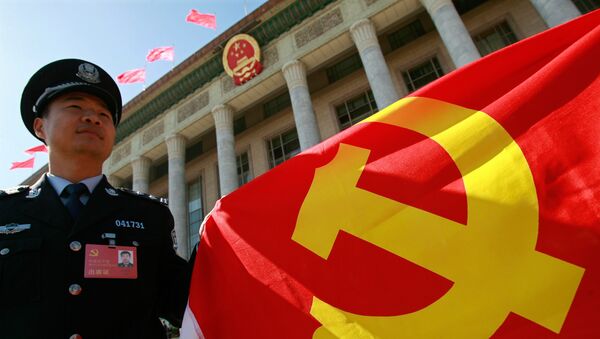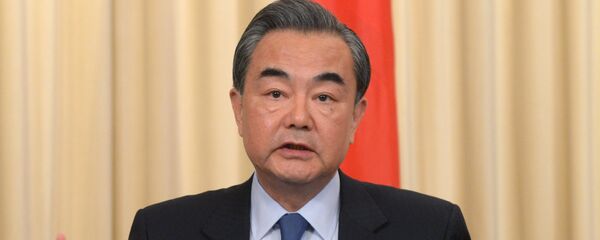CULTURAL EXCHANGE STAYED IN THE 1960S
The Communist brotherhood between the Soviet Union and China was mentioned repeatedly at the recent third international conference called Russia and China: Taking on a New Quality of Bilateral Relations, a two-day event on modern Russia-China relations that concluded in Moscow on Tuesday.
Song Jingwu, the vice president of the Chinese People's Association for Friendship with Foreign Countries (CPAFFC) and the deputy chairman of the China-Russia Friendship Association, stressed the tight-knit relations Soviet-Chinese in his opening speech at the conference.
"In the early days after the founding of People’s Republic of China, the cultural exchange between USSR and China were very rich and extensive. Russian language classes were offered in Chinese elementary and middle schools. Russian films, plays and ballet had a strong impact on the development of arts in China," Song said.
The popularity of Russian culture, including music, films and literature reached its peak in the 1960s in China. Even Chinese films produced during that time carried a unique "Communist" accent, which made it sound almost identical to Russian films. A large number of Russian songs were translated into Chinese language and became household favorites.
Those Chinese born during that era embraced the Russian culture immensely. Former Chinese President Hu Jintao, born in 1942, was seen performing the Russian song "Moscow Nights" in Chinese language at a government banquet in 2006. Chinese First Lady Peng Liyuan, born in 1962, who used to be a famous folk singer and released a number of albums, performed the song "Oh the Snowball Bush Blooms" in Russian language on various occasions.
But today, many Chinese consider the cultural exchange between the Soviet Union and China to be one-sided.
"It was mostly a one-way exchange, in which China was learning everything from Russia," Song said.
Younger people in China, unlike their parents, are no longer attached to Russian culture. Instead, they became loyal fans of Western artists and sports stars. For example, retired NBA star Kobe Bryant has over 5 million followers on Chinese social media website Weibo.com. US pop singers such as Beyonce and Katy Perry have 2.3 million and 1.2 million followers, respectively, in China.
In comparison, popular Russian artists such as Timati, Basta or Loboda don’t even have a presence on Chinese social media. The most popular Russian artist on Weibo.com is Vitas, who is well known in China for his high-pitched voice. But he only has about 250,000 followers in China and is almost unknown to the Russian audience. When Russian singer Egor Kreed tried to use Chinese language on the cover of his new album called "What They Know," the Chinese words contained simple grammar mistakes.
The number of Chinese students studying overseas is also a good indicator of overall interest in the destination country.
Vladimir Gusev, the director of the State Russian Museum, shared his personal experience of this change with the audience at the conference. According to Gusev, while he could sing Russian songs together with older Chinese scholars, he found it very difficult to find an excellent younger Chinese interpreter of Russian language.
Chinese scholars also expressed concern over the lack of mutual understanding and interests in the modern cultures of both nations.
"When we talk about Sinology, I hope it can be evolved into the New Sinology. In addition to traditional Chinese culture, it also has to include interpretations of modern Chinese culture. Of course, our research into Russian culture should also not be restricted to traditional Russian literature. We also need to expand our research into modern economic, political and social topics in Russia," Zhu Guanglei, vice dean of Nankai University in Tianjin, China, said.
Wu Fengshi, associate professor of Nanyang Technological University in Singapore, offered a popular phrase among Chinese scholars to describe China’s relations with the United States and with Russia.
"The exchange between China and the United States happens in grassroots, while the exchange between China and Russia stays in the higher temples [government level]," she said.
HOW TO DEAL WITH AN ASSERTIVE CHINA
At Monday’s discussion session on Russia and China’s interest in the Arctic region, Guo Peiqing, executive director of the Institute of Polar Law and Policy at the Ocean University of China, voiced a strong Chinese position on the issue.
"I think the world has entered a new era. Integration of Asia and Europe is also entering a new age. The Northern Sea Route can become an important supplement to China’s OBOR [One Belt, One Road] initiative," Guo said.
Guo went on to stress that China’s state-owned-enterprise Poly Group Corporation will build the Belkomur railway, a project that will link the mining and industrial areas in the south Urals to the port of Arkhangelsk via Syktyvkar in the Komi Republic.
During the same session, Vyacheslav Zilanov, chairman of Russia's Northern Coordination Council of Fishery Associations, Unions and Enterprise of the Northern Basin, reminisced his Soviet experiences. According to Zilanov, the Soviet Union caught 11 million tonnes of fish each year while China was only able to catch 4 million tonnes of fish at the time. But today, China’s fishing output reached 25 million tonnes per year, while Russia’s dropped to 4 million tonnes per year.
Commenting on potential economic cooperation in Russia’s Far East regions, Li Yongquan, director of the Institute of Russian, East European and Central Asian Studies at the Chinese Academy of Social Sciences (CASS), suggested that the Russian port city of Vladivostok could be used for China to move products domestically from its northeast regions to coastal Chinese cities in the southeast by sea.
Historically, Vladivostok has been the sore spot for many Chinese for over a century, after Chinese emperors of the Qing dynasty gave up the territory through the Beijing Treaty following the end of the Second Opium War in 1860.
When Chinese President Xi Jinping talked about his initiative of "the great revival of the Chinese nation," he often cited China’s defeat in the two Opium Wars as an important lesson. The period following the Opium Wars is often referred to in China as "the century of humiliation."
Unsurprisingly, when Xin Zhongyi, the vice president of China Gezhouba Group Corporation (CGGC) mentioned the city of Vladivostok at the conference, he used "Hai Shen Wai", the Chinese name for the city during the Qing Dynasty, instead of the formal phonetic translation of the name into Chinese.
Xin may not have used the old Chinese name of Vladivostok intentionally, but for many Chinese like Xin, it is not easy to forget about history.






